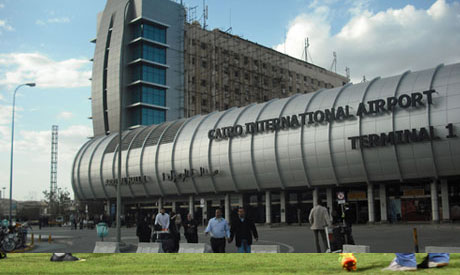Latest NEWS
- Aswat Masriya, the last word
- Roundup of Egypt's press headlines on March 15, 2017
- Roundup of Egypt's press headlines on March 14, 2017
- Former Egyptian President Hosni Mubarak to be released: lawyer
- Roundup of Egypt's press headlines on March 13, 2017
- Egypt's capital set to grow by half a million in 2017
- Egypt's wheat reserves to double with start of harvest -supply min
- Roundup of Egypt's press headlines on March 12, 2017
Egyptians face institutionalised travel restrictions

Cairo International Airport - Reuters
By Jihad Abaza
CAIRO, Dec. 3 (Aswat Masriya) - Fatema Niazy and her parents packed their bags and headed to the airport for a planned trip to Turkey over the Eid break in September, only to be turned back by airport security. "No permit, no travel," the officers told them.
In December 2014, the Ministry of Interior had announced that Egyptian passport holders aged 18-40, require state security authorisation to travel to Turkey, Qatar, Syria, Lebanon, Iraq, Libya and Sudan. In August, about a dozen more additional countries made it to the security permit requirement list.
Before booking the trip, Niazy had asked about the permits, but was told that security documents were only mandatory for young men, not women. While this had initially been the case, women are now only allowed to travel to Turkey on a tourist visa with either their fathers or husbands, and must still get security approval.
Different rules apply for business or other types of visa but having a U.S. visa or a Schengen "facilitates" the process, Niazy told Aswat Masriya.
While much has been said about the effect on the tourism industry and investment, and the climate of political tensions between Egypt and other countries, at times even leading to flight suspensions, there has been little focus on the impact of these official decisions on travel for ordinary Egyptians.
With a hike in flight halts and travel restrictions, Egyptian passport holders are finding it increasingly difficult to travel.
Security bodies now require citizens aged 18-45 to obtain a state-issued "security approval" before travelling to 16 countries after adding Jordan, Malaysia, Yemen, South Africa, Indonesia, Thailand, South Korea, Guinea and Israel to the earlier list.
These countries were previously easy travel destinations, especially that many of them did not require a visa from Egyptian passport holders and in light of the mounting difficulty of securing visas to Europe and North America.
Broad restrictions
Official statements claim that the decision to impose travel permits aims to prevent members of "banned groups" and "terrorists" from escaping the country.
But in a damning report by Human Rights Watch published on Nov. 1, the rights group said that "Security agencies are increasingly putting in place restrictive and intimidating measures that include confiscating passports" targeting leaders and members of political parties, youth activists and people associated with nongovernmental groups.
The report, which documented 32 cases, also said that the "Interior Ministry’s Passport and Immigration Authority at Cairo International Airport have wide authority to require any citizen to obtain a security clearance to leave the country, no matter their destination or the purpose of their visit."
Additional bureaucratic processes have even started on university campuses, with young men representing particularly easy targets.
Mahmoud Said, a sophomore at Alexandria University was unable to travel to Denmark when his university refused to issue the enrollement certificate he needed to get his military travel permit, a document required by all conscription-aged men that must be presented to passport control officers at the airport.
Said told Aswat Masriya that he had never faced this problem before.
When his request was denied last week, the university explained that their refusal was based on a recent security decision banning students from travelling to events that are not hosted by other universities.
Said, a member of Masr Al-Horeya Party, was invited to attend an event organized by one of the Danish parties with which Masr Al-Horeya cooperates to exchange experience, as is the case with other small Egyptian parties, he said.
According to new rules, the university must send a request to security bodies on behalf of student before releasing the necessary enrollement document. If the request is denied, the university cannot issue it and hence the student cannot get the necessary military clearance.
High profile cases and condemnations
The Arab Network for Human Rights Information (ANHRI) recently condemned the Egyptian Embassy in Beirut's refusal to renew the passport of ex-presidential candidate and opposition figure Ayman Nour, calling it a "dangerous violation of his right to freedom of movement," in a statement published on Nov. 30.
Human Rights Monitor called Egypt's travel restrictions an impeachment of peoples' right to freedom of movement, noting that "the organization sees that these restrictions are meant to crack down on opponents of the authorities, but they harm the interests of citizens and are not limited to the opposition."
An official poverty rate of over 26 percent, according to the state-owned CAPMAS, (and likely a much higher unofficial count) makes travel already difficult for the majority of Egyptians.










